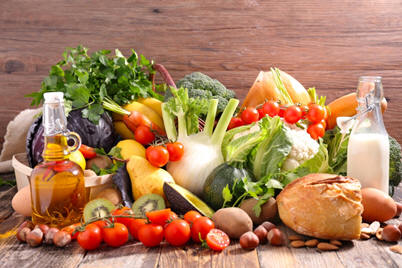|
To determine
nutrient needs, we can start with a baseline of what a person
without a wound might need to maintain nutritional status and
health. Fluid requirements are based on fluid turnover. In the case
of wounds, increases to 30-40 milliliters per kilogram per day can
be seen due to the additional losses through heat generated and
exudate from the wounds.
In general a
healthy person will need around 25 calories per kilogram per day. An
elderly person might require less, or around 20 calories per
kilogram per day. When a person has a wound, energy requirement may
increase 30-50% to around 30-40 calories per kilogram per day. While
patients who are malnourished at baseline may require some
additional calories to both support wound healing and restore
nutritional status, caution should be used in increasing calorie
intake to prevent complications of overfeeding. In the case of
obesity, it may be possible to maintain an adequate energy intake at
a lower level of around 20-25 calories per kilogram per day.
Carbohydrates remain the primary source of energy in wound healing
situations, providing 55-60% of energy needs. About 20-25% of
calories are recommended as fat or below around 2 grams per kilogram
per day.
Protein
requirements can double during injury and infection. In general,
protein requirements during chronic wounds and to correct protein
malnutrition could be considered around 1.5 grams per kilogram per
day, which is about twice the recommended intake for healthy people
and, as it happens, about the level of intake in the average
American diet. Patients who have difficulty in getting adequate
protein may require education on which foods emphasize dietary
protein, high quality protein sources, and even supplemental
protein, in some cases. An emphasis is placed on protein in dietary
planning for the elderly, unless contraindicated by renal disease.
The reason for this is that if excessive calories are consumed,
protein calories can be utilized to maintain lean tissues and reduce
the chance for the development of sarcopenia (or literally the loss
of muscle tissue) and while gaining too much in the fat compartment.
Dietary protein intake should account for about 20-25% of calories.
Specific Nutrient Recommendations
•Micronutrients:
–Vitamins
•Vitamin
A
•Vitamin
C
•Vitamin
E
|
 |
|
Micronutrients are important for cellular function.
Deficiencies can reduce the healing potential for
wounds, and may exacerbate the inflammatory process and
continued catabolism. Vitamins most noted in wound
healing include vitamins A, C, and E. Vitamin A is
essential to stimulate initiation of the wound healing
process and building of epithelial layers and collagen.
Vitamin A is also helpful to maintain immune function
and is involved in protein anabolism.
Vitamin C is essential to collagen synthesis. It is
helpful to reduce the damage to tissues by acting as an
antioxidant, supporting immune function as well.
Vitamin E acts as an antioxidant, helping to reduce
tissue damage and also helping to maintain cell membrane
integrity. |
|




